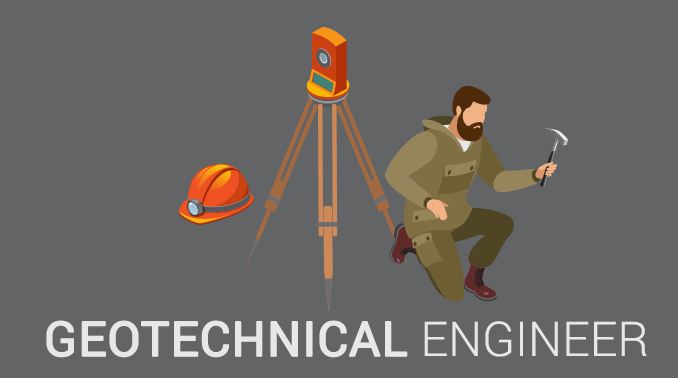The Basic Principles Of Geotheta
Wiki Article
The Basic Principles Of Geotheta
Table of ContentsNot known Details About Geotheta 8 Simple Techniques For GeothetaTop Guidelines Of GeothetaFascination About Geotheta9 Easy Facts About Geotheta Shown

They conduct site examinations, gather examples, carry out research laboratory examinations, and analyze data to review the suitability of the ground for construction tasks - Geo Tech Engineering. Based on their searchings for, geotechnical engineers supply referrals for foundation style, slope security, retaining structures, and mitigation of geotechnical hazards. They team up with other professionals, such as architects, architectural engineers, and building and construction teams, to make certain that geotechnical considerations are incorporated right into the general task design and application
By analyzing the actions and properties of soil and rock, they can recognize prospective geotechnical dangers such as landslides, soil settlement, or slope instability. Their experience assists stop failings or crashes that might jeopardize lives and property. Here are some thorough responsibilities and duties of a geotechnical designer: Site Investigation: Geotechnical designers conduct website investigations to collect data on subsurface conditions.
They analyze the data to recognize the buildings and actions of the soil and rock, including their toughness, permeability, compaction qualities, and groundwater conditions. Geotechnical Analysis and Design: Geotechnical designers analyze the data gathered during site examinations to analyze the security and viability of the website for building jobs. They execute geotechnical calculations and modeling to examine elements such as birthing capability, negotiation, incline stability, side planet pressures, and groundwater flow.
9 Easy Facts About Geotheta Explained
Foundation Style: Geotechnical engineers play a critical duty in making foundations that can safely support the designated structure. They analyze the dirt conditions and load demands to determine the ideal foundation kind, such as shallow foundations (e.g., footings), deep foundations (e.g (https://www.tripadvisor.in/Profile/geotheta1)., piles), or specialized techniques like soil renovation. They take into consideration factors such as settlement limitations, birthing capability, and soil-structure communication to develop ideal structure designsThey review construction plans, monitor site tasks, and conduct area evaluations to confirm that the style referrals are followed. If unpredicted geotechnical concerns occur, they analyze the situation and supply recommendations for removal or modifications to the layout. Risk Evaluation and Mitigation: Geotechnical designers examine geotechnical risks and risks connected with the job website, such as landslides, liquefaction, or soil disintegration.

Partnership and Communication: Geotechnical engineers function very closely with other experts associated with a job, such page as engineers, structural engineers, and construction teams. Efficient communication and cooperation are vital to incorporate geotechnical considerations into the total project style and building procedure. Geotechnical engineers give technical experience, answer queries, and guarantee that geotechnical demands are fulfilled.
8 Easy Facts About Geotheta Shown
Here are some types of geotechnical designers: Structure Engineer: Foundation designers specialize in developing and assessing foundations for structures. They analyze the dirt problems, tons demands, and website features to establish the most ideal foundation type and design, such as shallow foundations, deep foundations, or specialized techniques like stack structures.They examine the variables influencing incline security, such as dirt buildings, groundwater problems, and incline geometry, and develop methods to stop incline failings and minimize dangers. Quake Designer: Quake designers concentrate on evaluating and creating structures to stand up to seismic pressures. They examine the seismic threat of a website, review dirt liquefaction capacity, and establish seismic style requirements to make certain the safety and resilience of structures throughout quakes.
They do field screening, collect examples, and analyze the gathered information to characterize the dirt residential properties, geologic formations, and groundwater problems at a site. Geotechnical Instrumentation Engineer: Geotechnical instrumentation engineers concentrate on surveillance and gauging the actions of soil, rock, and structures. They mount and preserve instrumentation systems that check elements such as dirt negotiation, groundwater levels, incline motions, and structural variations to examine performance and give very early cautions of possible problems.
The smart Trick of Geotheta That Nobody is Discussing
They perform tests such as triaxial examinations, consolidation tests, straight shear examinations, and permeability examinations to collect data for geotechnical evaluation and design. Geosynthetics Designer: Geosynthetics engineers focus on the layout and application of geosynthetic products, such as geotextiles, geogrids, and geomembranes. They use these products to enhance soil security, strengthen slopes, offer drainage remedies, and control erosion.They often tend to be investigatory individuals, which implies they're intellectual, introspective, and inquisitive. They are interested, methodical, reasonable, logical, and logical. A few of them are likewise social, suggesting they're kind, charitable, cooperative, person, caring, valuable, understanding, sensible, and pleasant. Does this seem like you? Take our complimentary job examination to learn if geotechnical engineer is just one of your leading profession matches.
In the office environment, geotechnical engineers make use of specialized software devices to execute estimations, produce designs, and analyze information. They prepare records, review task requirements, communicate with customers and group members, and coordinate project tasks. The office setting gives a favorable atmosphere for research, evaluation, and partnership with various other specialists entailed in the task.
The Of Geotheta
They often see job websites to conduct website examinations, examine geotechnical conditions, and collect information for analysis. These brows through include taking a trip to different places, occasionally in remote or challenging surfaces. Geotechnical designers may do dirt sampling, conduct tests, and display building tasks to ensure that the geotechnical elements of the task are being implemented correctly.Geotechnical engineers also work in specialized geotechnical research laboratories. Geotechnical laboratory engineers work extensively in these environments, handling testing equipment, operating instruments, and videotaping data.
Report this wiki page